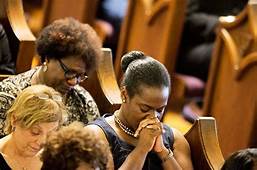These all Died, Not having received the Promise
- pastorfloyd8
- May 17, 2021
- 3 min read
Written in consultation with the pastors of Marin County ( Rev. Dr. Ronald Leggett, Bishop Johnathan D. Logan, Sr, Rev. Marcus Small, and Rev. Floyd Thompkins)
worldwide
Edited by T. Lai
Without intentional, clear memorials, and services of remembrances, human beings will tend to forget even the most painful and significant of events. Our minds want to move on. In the rearview mirror, our memories of pain, individual and collective, often look and feel less imposing and less important than when we lived through it. If we do not intentionally and clearly remember the pain, hurt, and loss of those who died, they will pass and with them, the lessons learned from their experience, into the ether of so many forgotten lessons that we should have learned.
In the United States, there are no major memorials for the 1918 Flu pandemic despite the fact that the 1918 pandemic took 50 million lives world-wide.
On May 22, 2021, at the Rocky Graham Park, the Marin City Ministerial Alliance is calling for the community to gather to intentionally remember those who have died during the pandemic. This includes not only those who have died from COVID-19 but all people who have died in a time when they could not be mourned with ceremony and their families could not be surrounded with the physical connection of community.
As the COVID-19 pandemic continues, we have been stymied by political impotence, social unrest, and economic distress of epic proportions. This virus has also laid bare the social inequalities of our society. Not only have more than 575,000 people died from COVID-19, equivalent to twice the population of Marin County, but people of color have also died at an alarming rate far greater than their proportion of the population. The elderly have also borne the brunt of the first waves of the pandemic.
We as a nation are confronted with the question of whether a person’s individual choice to be selfish outweighs the societal requirement to be disciplined. Indeed, even after the vaccines were developed this fundamental question, posed in scripture, is a persistent political, social and ethical question of today, “Am I my brothers’/sisters’ keeper?” Even people of faith have faltered in answering this question. One cannot profess empathy and compassion yet claim the right to be selfish. Love, citizenship, and justice require sacrifice.
Many of the families of those who died are not experiencing a normal grief cycle. Rather they are experiencing complex and trauma-informed grief. They were robbed of the ability to be at the bedside of their loved ones, to feel the press of hugs, and smell the food brought to support the mourning and bereaved that fills the household of the families of the deceased.
This is why the Marin City Ministerial Alliance is requesting that the community come together on May 22 and create space for all of us to remember and reflect, to find unity in suffering and resolve, and to address and honor the haunting gifts that our friends and relatives gave to us in the hour of their passing. In doing so we will also encourage people to get vaccinated, seek counseling, and remember that the promise of our humanity demands the vigilance of our passion to love the least among us, and the resolve to speak the truth, sacrifice for love, and keep focused on hope.
We will honor those who died, not by going back to what was normal, but by creating a new normal of a beloved community. We draw upon our faith in God and the Holy Spirit that leads us– this is how humanity has always survived and evolved through the chaos of wars, pandemics, natural disasters, and other cataclysmic events. In such gatherings, hope arises to fight despair. Peace asserts itself against the terror of fear. Joy breaks through the dark clouds of destruction.






Comments